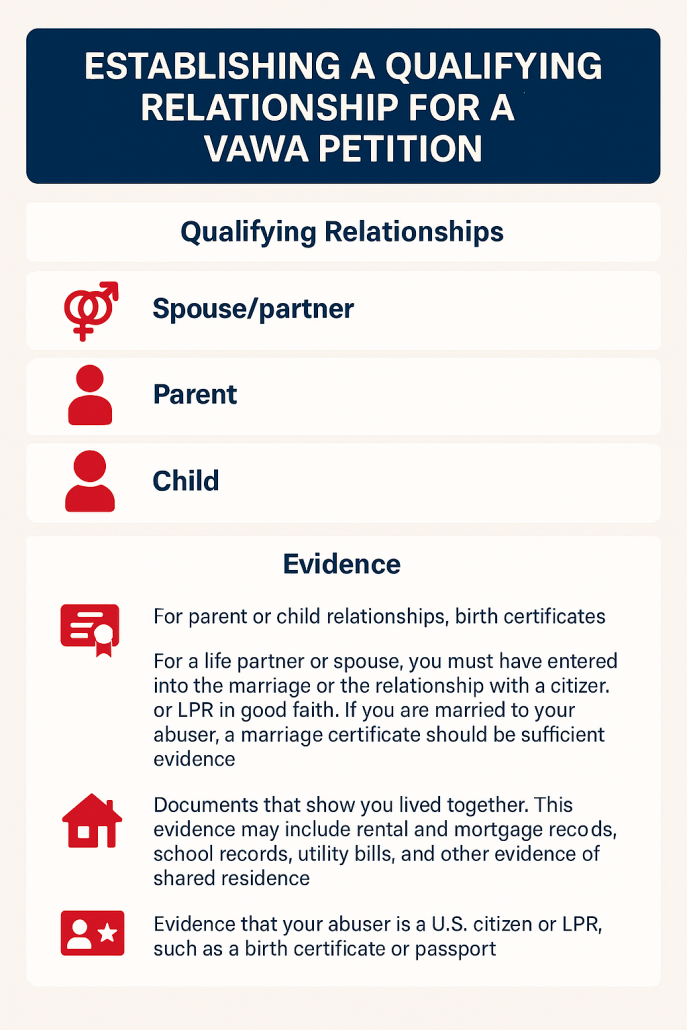What Evidence Do I Need To File For VAWA?
The Violence Against Women Act (VAWA) provides a path to permanent resident status for victims of domestic violence and abuse, provided they meet specific criteria. Documentation or evidence includes proof of your identity and that you are a person of good moral character. In addition, among other requirements, you must establish that you were in a qualifying relationship with a U.S. citizen or lawful permanent resident (LPR).
The immigration attorneys at Bassey Immigration Law Center can help you with all aspects of your VAWA petition, including gathering the evidence you need to move closer to your green card and a life that is independent of your abuser. We provide responsive support for individuals, families, and business owners who are struggling with immigration matters, especially for those seeking a VAWA petition.
Proof of Your Identity and Character
The process begins with a Personal Declaration for VAWA Self-Petition. It is a detailed declaration that describes the abusive relationship with your partner, a U.S. citizen or LPR. It should start with the statement, “I swear under penalty of perjury that the following is true and correct to the best of my knowledge.” It is essential to be as specific as possible. For example, where you met, why you married them, and the types of abuse you suffered.
You must also be able to provide proof of your identity and that you are a person of good moral character. You may satisfy the first part of this requirement by submitting a copy of your birth certificate or passport.
You can demonstrate your moral character by obtaining a police clearance certificate in jurisdictions where you have lived for at least six months within the past three years. If you have a clean criminal record, this document will prove that to immigration authorities. Other documents that may strengthen your claim include signed declarations from friends, family members, and others who attest to your good character.
Details of Your Relationship

You must establish that you have been in a qualifying relationship with a U.S. citizen or LPR. Qualifying relationships include the following:
- Spouse/partner
- Parent
- Child
Evidence that can prove this part of your VAWA petition includes:
- For parent or child relationships, birth certificates
- For a life partner or spouse, you must have entered into the marriage or the relationship with a citizen or LPR in good faith. If you are married to your abuser, a marriage certificate should be sufficient evidence.
- Documents that show you lived together. This evidence may include rental and mortgage records, school records, utility bills, and other evidence of shared residence.
- Evidence that your abuser is a U.S. citizen or LPR, such as a birth certificate or passport.
Evidence of Abuse
Compelling evidence of abuse may include:
- Police records of arrests or domestic violence calls.
- Orders of protection (restraining orders).
- Medical records showing evidence of physical or psychological abuse.
The abuse does not have to be physical to grant you protection under VAWA laws. Emotional and verbal abuse, if severe enough, may satisfy this requirement. If there are no police records regarding the abuse you have suffered, do not despair. These records can strengthen your claim, but they are not always necessary.
If you find obtaining the necessary documentation challenging, remember you don’t have to face this matter alone. An experienced immigration law attorney can help you gather the evidence and documents you need to maximize your chances of obtaining a green card and protection from abuse.
We Help with VAWA Applications
Petitioning for a VAWA-based green card is a sensitive legal matter that must be handled carefully. An experienced attorney for citizenship can help you understand your rights and guide you through seeking lawful permanent residence status or citizenship. To speak with a knowledgeable and compassionate immigration lawyer at Bassey Immigration Law Center, contact us today.
About Bassey Immigration Law Center, P.A.
Bassey Immigration Law Center, P.A., led by attorney Aniefiok Bassey, provides comprehensive immigration services to individuals, families, and businesses in Florida and beyond. With over 20 years of experience, the firm assists clients with a wide range of immigration matters, from family reunification and green cards to business visas and deportation defense. The diverse, multilingual team is dedicated to supporting clients through the complex immigration process, with a special focus on citizenship, asylum, and LGBTQ+ immigration needs. They offer affordable initial consultations and are committed to delivering personalized, strategic guidance for achieving clients’ immigration goals.



